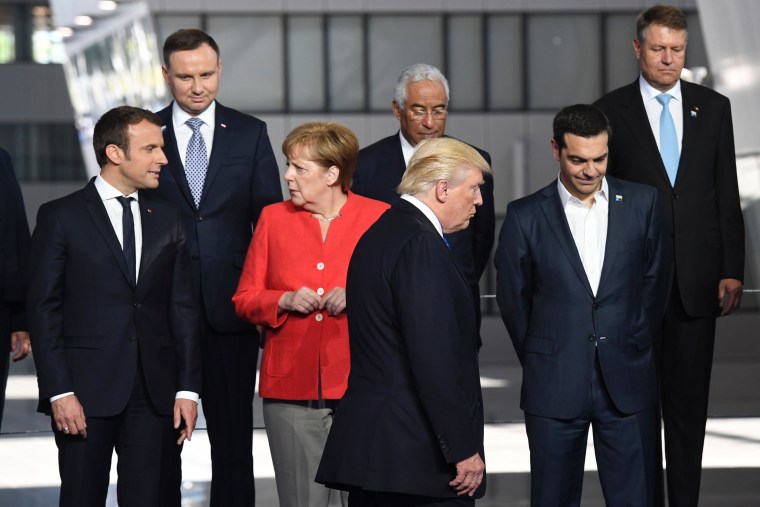Six years ago, Mitt Romney, then the Republican Party's presidential nominee, said Russia, "without question," was the United States' "number one geo-political foe." This sparked a fair amount of discussion, especially after then-President Barack Obama responded by pointing to terrorist groups such as ISIS as a more significant international adversary than a weakened Russia.
Republican perspectives have changed quite a bit since 2012. Donald Trump sat down with CBS News' Jeff Glor in Scotland over the weekend, and the anchor asked the Republican president to identify our "biggest foe globally right now." Trump's answer was extraordinary, even for him.
President Donald Trump is going into his much-anticipated meeting with Russian president Vladimir Putin on Monday having called the European Union "a foe" of the United States and with the promise that nothing bad will come from the discussion."I think we have a lot of foes," Trump told CBS Evening News in a segment of an interview that first aired on "Face the Nation." "I think the European Union is a foe, what they do to us in trade. Now you wouldn't think of the European Union, but they're a foe."
As part of the same response, the American president added, "Russia is foe in certain respects. China is a foe economically, certainly they are a foe. But that doesn't mean they are bad."
So, asked to name the United States' "biggest" international foe, the European Union -- which is to say, our allies -- was the first thing that came to Trump's mind. Russia and China came next, though the Republican's comments about them came with qualifiers.
On more than a few instances, Trump has said the European Union was formed in order to "take advantage of the United States " It wasn't -- he has no idea what he's talking about -- and the comments were so absurd that, late last month, they contributed to the resignation of one of the president's ambassadors.
But this weekend's rhetoric clearly represented an escalation. For Trump to refer to our allies as a "foe" may delight Russian President Vladimir Putin, but it adds unwelcome uncertainty to the Western Alliance.
In the same CBS interview, Trump hedged a bit when asked to explain himself.
"Look, EU is very difficult," the American president said. "I want to tell you. Maybe the thing that is most difficult -- don't forget both my parents were born in EU sectors okay? I mean my mother was Scotland, my father was Germany. And you know I love those countries. I respect the leaders of those countries. But in a trade sense, they've really taken advantage of us."
First, Trump's father was born in New York, not Germany. I'm not sure why he'd lie about such a thing.
Second, Trump continues to misunderstand the meaning of trade deficits.
Donald Tusk, president of the European Council, responded to Trump via Twitter yesterday, saying, "America and the EU are best friends. Whoever says we are foes is spreading fake news."
The American leader has not yet responded, though I imagine it's only a matter of time.
